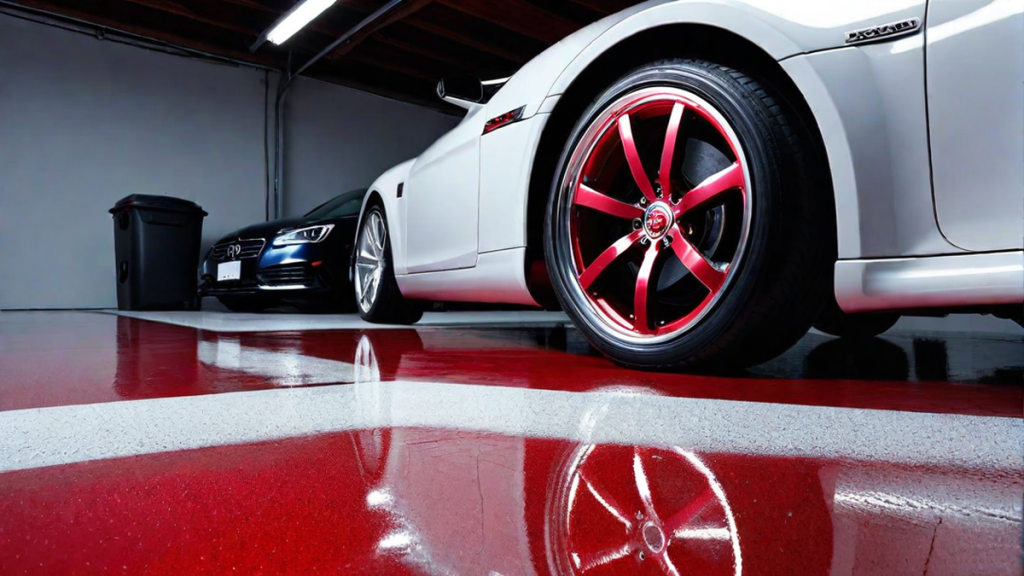Epoxy flooring on the North Side has become a prominent choice for both residential and commercial properties due to its durability, aesthetic versatility, and low maintenance requirements. Known for its resilience and longevity, epoxy flooring systems create a seamless and shiny finish that can withstand heavy foot traffic and industrial wear and tear. This flooring solution consists of a combination of resins and hardeners that, when mixed, create a chemical bond with the floor itself, transforming it into a tough and cohesive surface.

The selection of epoxy flooring includes a range of types and finishes, tailored for different environments and design preferences. From self-leveling epoxies ideal for creating a smooth, level surface on old or damaged floors to heavy-duty mortars that are the strongest of all epoxy floors, there is a type for every need. Moreover, options extend to various spaces such as garages, warehouses, and healthcare facilities, with finishes that can be non-slip, decorative, or resistant to high temperatures. These systems can often be customized in terms of color and patterns, offering limitless possibilities for interior design schemes.
Proper installation of epoxy flooring is critical to its performance and longevity. Preparation steps include repairing cracks and cleaning the substrate to achieve proper adhesion. Professional installation is recommended to ensure the flooring system achieves its full potential in terms of duration and functionality. Regular maintenance can further extend its lifespan, typically involving simple cleaning routines, while advanced technologies and proper repair can address any unexpected issues, ensuring the epoxy floor remains in exquisite condition for years to come.
Key Takeaways
- Epoxy flooring is valued for its strength and variety of finishes, suitable for numerous environments.
- Customization options provide wide-ranging design potential for different types of spaces.
- Expert installation and maintenance are key to maximizing the floor’s performance and aesthetics.
Understanding Epoxy Flooring
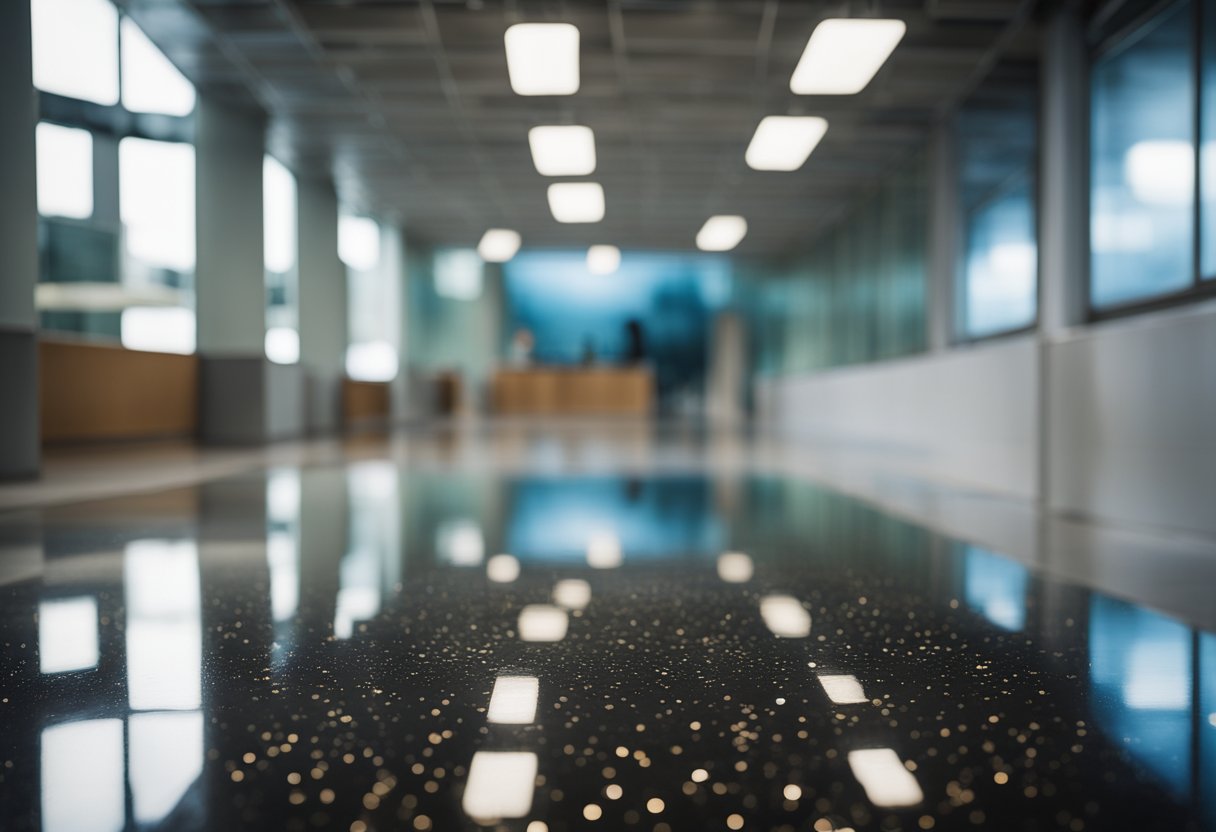
Epoxy flooring systems are known for their durability and diverse applications. They offer a resilient and long-lasting surface for various types of spaces.
Benefits of Epoxy Flooring
Epoxy flooring is celebrated for its robustness and longevity. A primary advantage is its resistance to wear and tear, making it ideal for high-traffic areas. Moreover, it is:
- Easy to clean: Epoxy floors resist stains and spills.
- Resistant to chemicals: This makes it suitable for industrial environments.
- Safe: Its anti-slip properties enhance safety in the workplace or home.
Epoxy vs. Other Flooring Types
Epoxy flooring stands out from other flooring options like concrete, hardwood, or tile. The comparative advantages include:
- Durability: Epoxy is tougher and less prone to cracking.
- Maintenance: Requires less upkeep compared to other floors.
- Aesthetics: Offers a glossy finish with various color and pattern options.
Components of Epoxy Flooring Systems
An epoxy flooring system comprises two main components:
- Resin: The clear top layer that provides the hard surface.
- Hardener: When mixed with resin, it forms a rigid plastic material.
These components, once cured, create a seamless and sturdy floor surface. The types of epoxy flooring can vary, primarily based on the mixture and application method, tailoring to the needs of the space.
Preparation and Installation
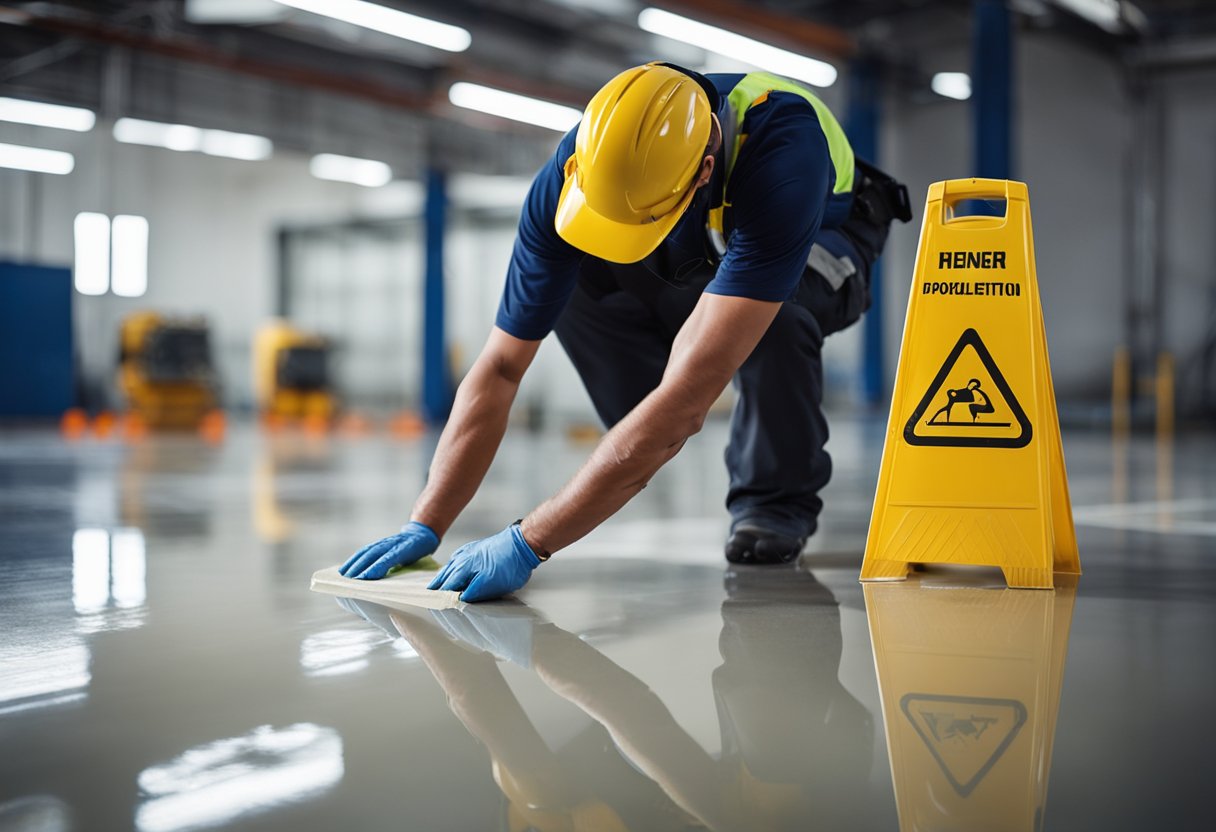
Proper preparation of the concrete surface and a systematic approach to the installation process are pivotal to ensuring a quality finish and longevity of an epoxy flooring system, especially in areas with high usage such as garage floors.
Epoxy Flooring Preparation
Surface Examination and Repair: The concrete substrate must first be carefully examined for any cracks or damage. It is crucial to repair any cracks using an epoxy-based crack filler. Surfaces should be free of oils, grease, or any debris.
- Cleaning: Thorough cleaning is essential, often involving the use of degreasers or industrial-grade cleaners.
- Floor Prep: It must then be etched or ground to create a porous surface for the epoxy to bond securely. Etching involves applying an acid-based solution to open up the pores of the concrete, while mechanical grinding may be used for tougher jobs or larger areas.
Drying: After etching, the concrete needs to dry completely, as moisture can interfere with the adhesion of the epoxy coating.
Installation Process
Primer Coat Application: A primer is applied to the concrete floor to enhance the adhesion of the epoxy coating.
- Mix the epoxy resin and hardener according to the manufacturer’s instructions.
- Apply the primer uniformly, ensuring thorough coverage.
Epoxy Layering: After the primer has set, sequential layers of epoxy are applied. Each layer must dry and cure properly before the next is applied.
- First Layer: Applied using rollers or squeegees, taking care to eliminate any bubbles or uneven spots.
- Additional Layers: Follow the same procedure for each subsequent layer, maintaining a wet edge to prevent lines between sections.
Final Touch: In high-traffic areas, such as a garage floor, a topcoat with additional anti-slip additives may be applied for increased durability and safety.
Common Installation Challenges
Temperature Sensitivity: Epoxy coatings require a controlled temperature to cure. Extremes in temperature can lead to improper curing.
- Moisture Issues: The presence of moisture in the concrete can lead to bubbling or poor adhesion of the epoxy coating. Moisture tests should be conducted before the installation to ensure the floor is adequately dry.
Time Constraints: Each stage of the epoxy flooring process has specific drying and curing times. Not adhering to these can compromise the quality of the flooring.
Types of Epoxy Flooring
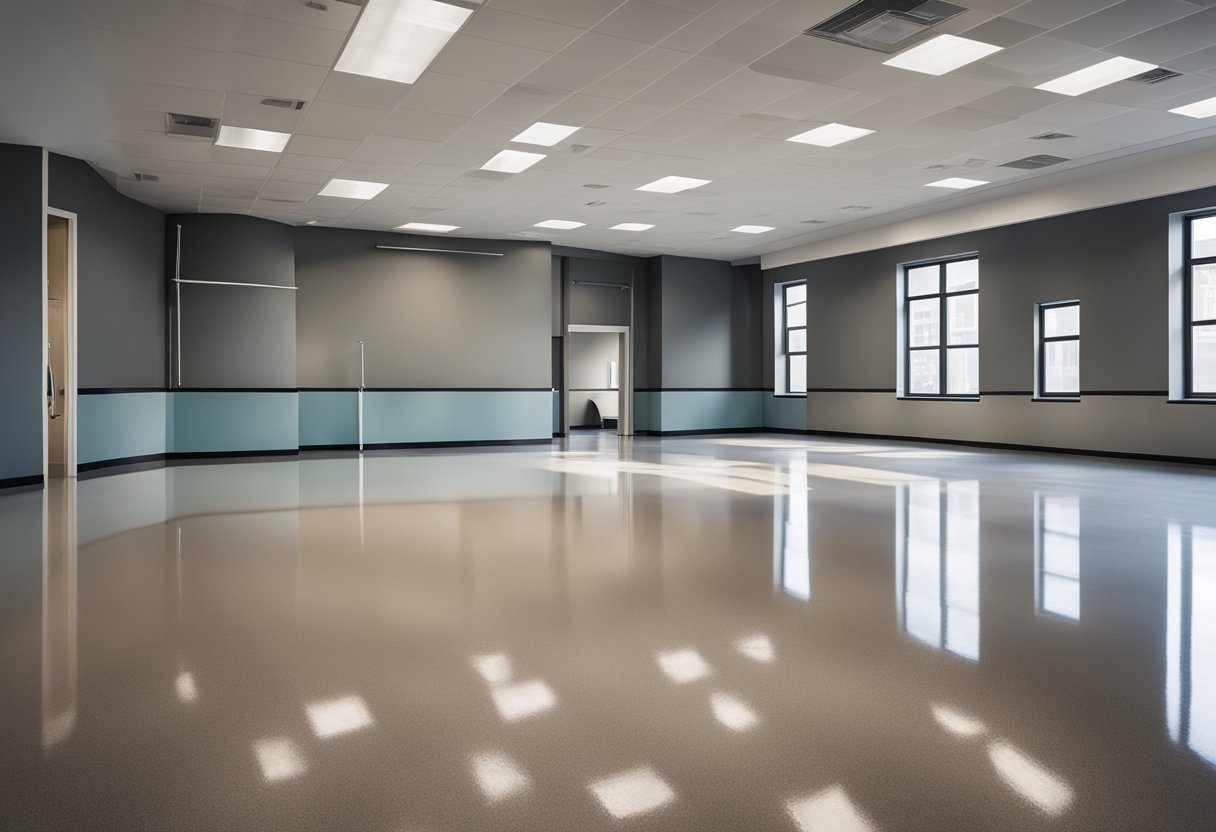
Epoxy flooring systems come in various formulations, each offering distinct characteristics and benefits. These coatings are commonly categorized by their carrier agents, colors, and finishes, with each specific type designed to meet particular performance parameters.
Water-Based Epoxy
Water-based epoxy coatings utilize water as the primary solvent. This type offers a lower volatile organic compound (VOC) content, making it more environmentally friendly. They are typically easier to apply and clean up due to their thinner consistency. Water-based epoxies are often used for light to medium traffic areas, providing good durability and a clear finish that enhances the underlying floor. Coverage rate usually ranges from 250 to 300 square feet per gallon.
Solvent-Based Epoxy
Solvent-based epoxy coatings contain organic solvents that allow for a more robust application. They are known for their strong adhesion and ability to penetrate and seal porous surfaces effectively. However, due to their high VOC content, they require adequate ventilation during application. These epoxies offer a thicker coating and can handle heavier traffic, but they often have a stronger odor compared to water-based systems. Coverage can vary widely but tends to be around 200 square feet per gallon.
Solid Color Epoxy
Solid color epoxy is characterized by its uniform appearance, offering a wide range of color options which can be customized. The solid color finish provides an opaque look that easily hides imperfections and stains on the existing floor. This type is valued for its durability and protective qualities, making it suitable for commercial and industrial settings where a practical and aesthetically pleasing floor is needed. Performance characteristics include resistance to chemical spills and high foot traffic.
Metallic Epoxy
Metallic epoxy floors incorporate metallic pigments, creating depth and movement within the finish that resembles marble or natural stone. These unique coatings deliver a high-gloss finish with dramatic visual effects, making them popular for showrooms, retail spaces, and residential interiors where a striking look is desired. Although they are aesthetically appealing, they do not compromise on performance and can withstand moderate to heavy traffic. Flake additives can sometimes be incorporated for additional texture and slip resistance.
Epoxy Flooring for Different Spaces
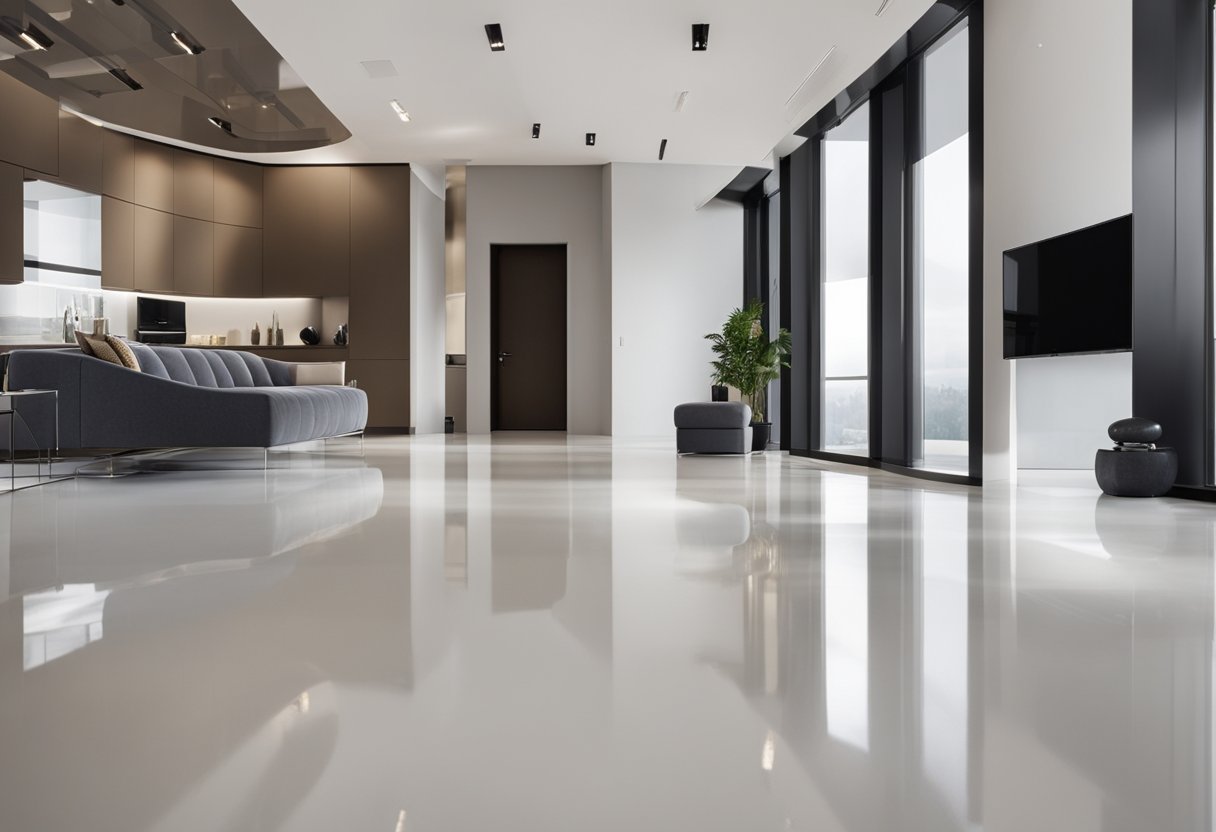
Epoxy flooring provides a durable and versatile solution for a variety of spaces, catering to the needs of commercial establishments, residential garages, and home interiors. Its resilience and ease of maintenance make it a top choice for high-traffic areas and specialized facilities.
Epoxy for Commercial Spaces
Commercial environments demand flooring that can withstand heavy foot traffic, frequent cleaning, and occasional spills. Epoxy floor coatings are ideal for these applications due to their robustness and longevity. Commercial epoxy flooring is extensively used in:
- Retail stores
- Restaurants
- Hospitals
- Schools
Flooring contractors often recommend epoxy for commercial kitchens and bathrooms because of its non-porous surface, which resists bacteria and stains. In addition, customized colors and patterns allow businesses to enhance their brand image directly through their flooring choice.
Epoxy in Garages
Garages are not only for parking vehicles but often double as workshops or storage areas. Therefore, garage floors require a surface that is resistant to chemicals, oils, and abrasion. Epoxy flooring in garages offers:
- A tough finish that withstands frequent use
- Resistance to automotive fluids
- Easy-to-clean surfaces for mechanic shops
Residential garages can benefit from the aesthetic appeal of epoxy as well, with a range of finishes that transform the space into a more inviting and functional area.
Epoxy Solutions for Home Interiors
Beyond garages and commercial spaces, epoxy floor coatings have gained popularity in domestic settings. Epoxy solutions are particularly well-suited for:
- Kitchens
- Bathrooms
- Basements
In the kitchen, epoxy withstands high traffic, spills, and heavy appliances. For bathrooms, its waterproof nature makes it an excellent choice, preventing mold and mildew growth. Basements, which can be prone to dampness and flooding, benefit from epoxy’s moisture-resistant properties, ensuring a dry and comfortable environment.
Epoxy Flooring Finishes
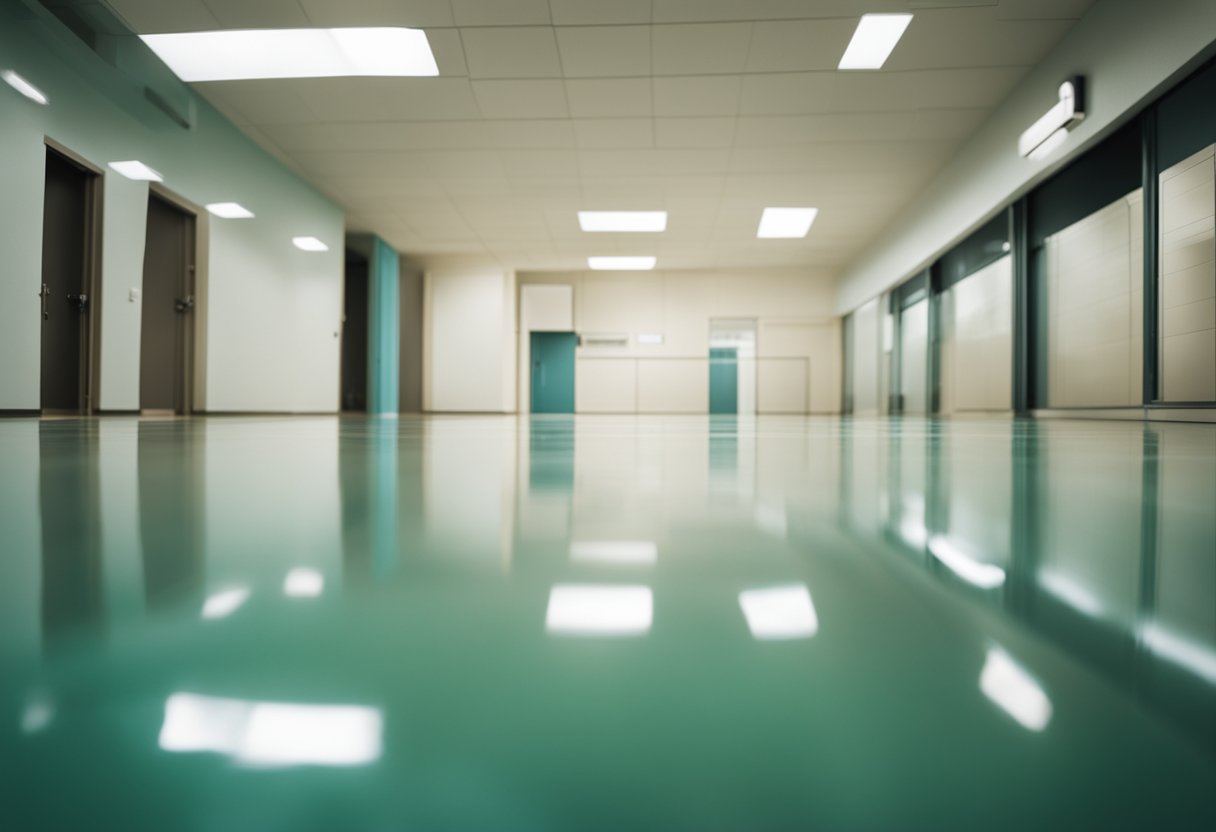
Epoxy flooring finishes are integral in enhancing both the durability and the aesthetic appeal of the flooring. They can include multiple layers, such as protective top coats, and can be modified with additives to change their texture or slip-resistance.
Protective Top Coats
Protective top coats are critical for extending the longevity and maintaining the appearance of epoxy floors. These coats offer a defense against abrasions, chemicals, and stains, ensuring the epoxy flooring remains in top condition. For industrial and commercial settings, the top coat plays a crucial role in prolonging floor life.
- UV Protection: Some top coats are formulated to prevent yellowing or fading from UV light.
- Wear Resistance: They often include polyurethane which increases the floor’s resistance to high foot traffic.
Adding a non-slip additive is a common practice to enhance safety in areas susceptible to moisture or spills.
Decorative Finishes
Decorative finishes provide epoxy floors with a unique appearance, making them a popular choice for spaces requiring an aesthetic touch along with functionality.
- Metallic Epoxy: This finish gives the floor a shimmering, iridescent look that can mimic natural stone or marbling.
- Colored Flakes: Acrylic chips or colored flakes can be broadcasted into the epoxy for a textured finish and additional slip resistance.
Texture in decorative finishes not only contributes to the visual quality but also to the practicality by reducing slipperiness on the epoxy flooring surfaces.
Maintenance and Repair
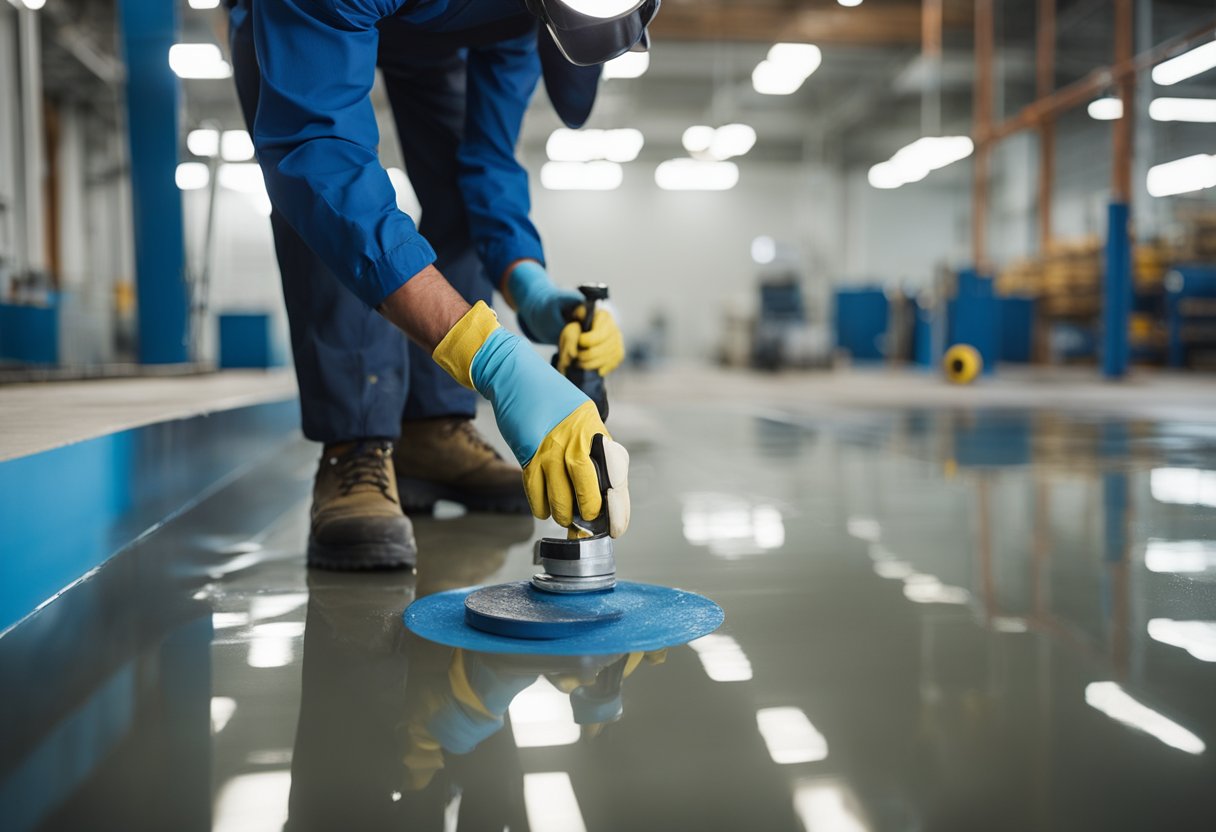
Epoxy floors combine robustness with ease of maintenance, making their upkeep essential to preserve their longevity and luster. Proper maintenance and responsive repair protect the investment and prevent deterioration.
Epoxy Flooring Maintenance
To ensure the prolonged beauty and functionality of epoxy floors, routine maintenance is key. Essential cleaning steps involve:
- Daily: Sweep with a soft-bristle broom or vacuum to eliminate surface debris.
- Weekly: Perform wet mopping with hot water and a hard foam mop.
- For more thorough cleaning, a diluted ammonia solution (2 to 3 ounces in a gallon of hot water) effectively cuts through grime without damaging the epoxy.
It is crucial to avoid harsh chemical cleaners or soap-based products, as they may leave a hazy residue and diminish the floor’s slip resistance and brilliance.
Troubleshooting Common Issues
Over time, it’s possible for epoxy floors to display signs of wear, such as small paint chips or peeling edges. When these issues arise, they typically require prompt attention:
- Minor Chips/Paint Flaws: Clean the affected area, then apply a patch of new epoxy.
- Peeling Edges: Remove the loose material, ensure the substrate is clean, and apply a fresh layer of epoxy to repair the damaged section.
Consistent and correct maintenance combined with timely repairs contribute to maximizing the lifespan of epoxy flooring. It is always recommended to follow the manufacturer’s specific instructions for both maintenance and repair to ensure the best results.
Advanced Epoxy Flooring Technologies
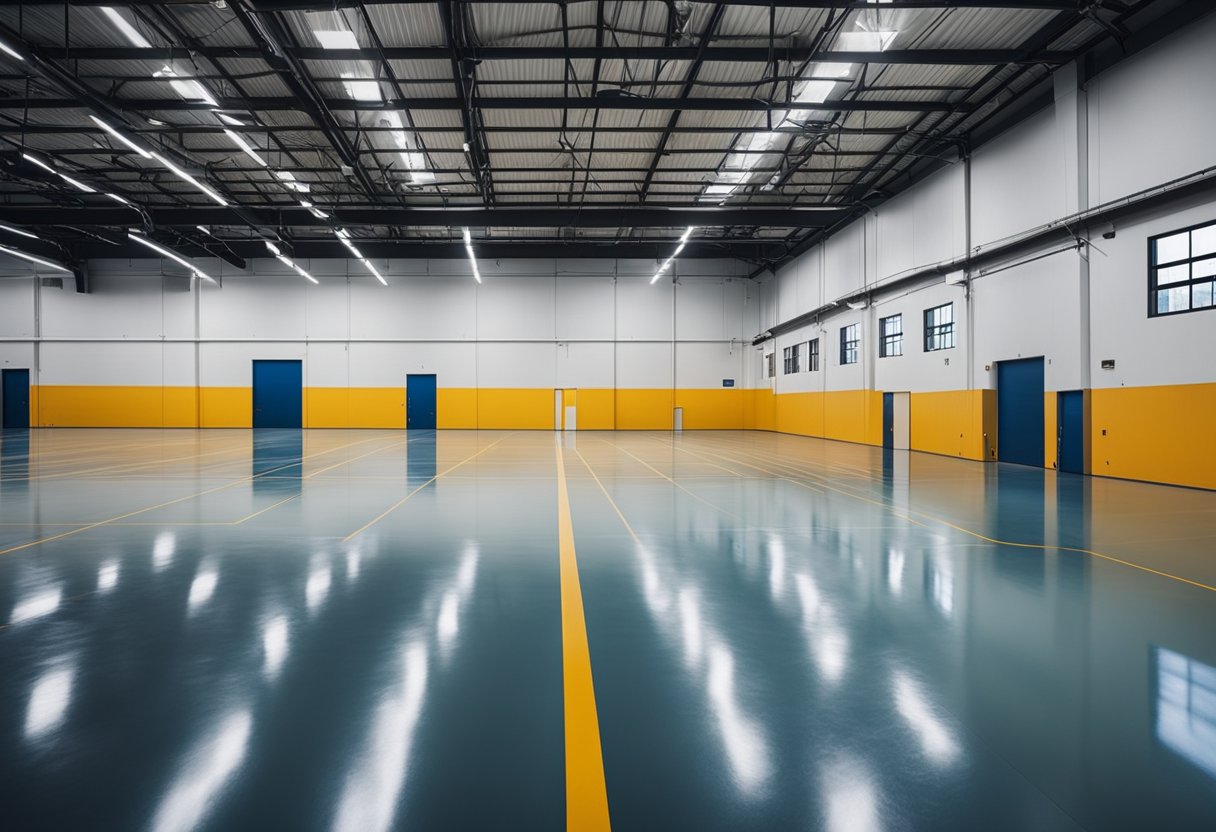
Advanced epoxy flooring technologies enhance the durability and functionality of floors in various settings, employing materials like polyurea and polyaspartic for superior performance. These materials contribute to longer-lasting floors with improved resistance to wear and environmental conditions.
Polyaspartic and Polyurea Coatings
These coatings are a significant upgrade from traditional epoxy solutions. They offer rapid curing times and are known for their resilience. Polyaspartic coatings possess a high tolerance to UV radiation and maintain transparency without yellowing over time. Furthermore, polyaspartic can be applied at a wide range of temperatures, making it versatile for different climates.
Polyurea, akin to polyaspartic, is lauded for its strength and flexibility. It handles extreme temperature fluctuations well and is highly resistant to chemicals and abrasions. These qualities make polyurea coatings particularly suited for industrial environments that demand a tough floor coating that lasts.
Anti-Slip and Waterproofing
To prevent accidents, floors must be safe to walk on, even in wet conditions. Advanced epoxy technologies incorporate anti-slip features by adding aggregates to the coating mixture, creating a textured surface that provides traction. Facilities prioritize this feature to ensure safety for staff and visitors.
Waterproofing capabilities are critical in environments exposed to spills or moisture. Advanced epoxy flooring employs techniques and materials that form an impermeable barrier to moisture. This is vital in protecting the substrate from water damage and mold growth. Polyurethane is often a component in these systems due to its robust waterproofing properties, ensuring long-term protection.
DIY vs. Professional Epoxy Flooring

Epoxy flooring is a durable option for both residential and commercial spaces. Homeowners and business owners must consider whether to use DIY kits or hire professionals to achieve the desired outcome.
DIY Epoxy Flooring Kits
DIY epoxy flooring kits, such as those produced by Rust-Oleum, offer a cost-effective solution for individuals comfortable with tackling home improvement projects. These kits typically include the epoxy resin, hardener, and sometimes decorative chips or color pigments. Users must follow the instructions carefully, as the proper mixing and application are crucial for a successful outcome.
Pros:
- Cost Savings: DIY kits can be less expensive than professional services.
- Personal Accomplishment: There’s a sense of pride in completing the project oneself.
Cons:
- Skill Level: Incorrect application can lead to poor results.
- Time Investment: The process can be time-consuming and labor-intensive for DIYers.
Hiring Professional Flooring Contractors
Professional flooring contractors have the experience and expertise to ensure a high-quality finish. Professional installation typically involves a team of craftsmen who prepare the surface, fix any cracks, apply the epoxy flooring, and add any decorative finishes.
Pros:
- Expertise: Professionals bring valuable knowledge that can prevent common mistakes.
- Efficiency: Contractors work more rapidly and can ensure the epoxy cures correctly.
Cons:
- Cost: Hiring professionals is a more substantial financial investment than a DIY approach.
When choosing between DIY and professional epoxy flooring, consider the complexity of the project, your own skill level, and your budget. Professional installation provides peace of mind with guaranteed results, while DIY kits offer a hands-on experience with potential savings.
Factors Influencing Epoxy Flooring Performance
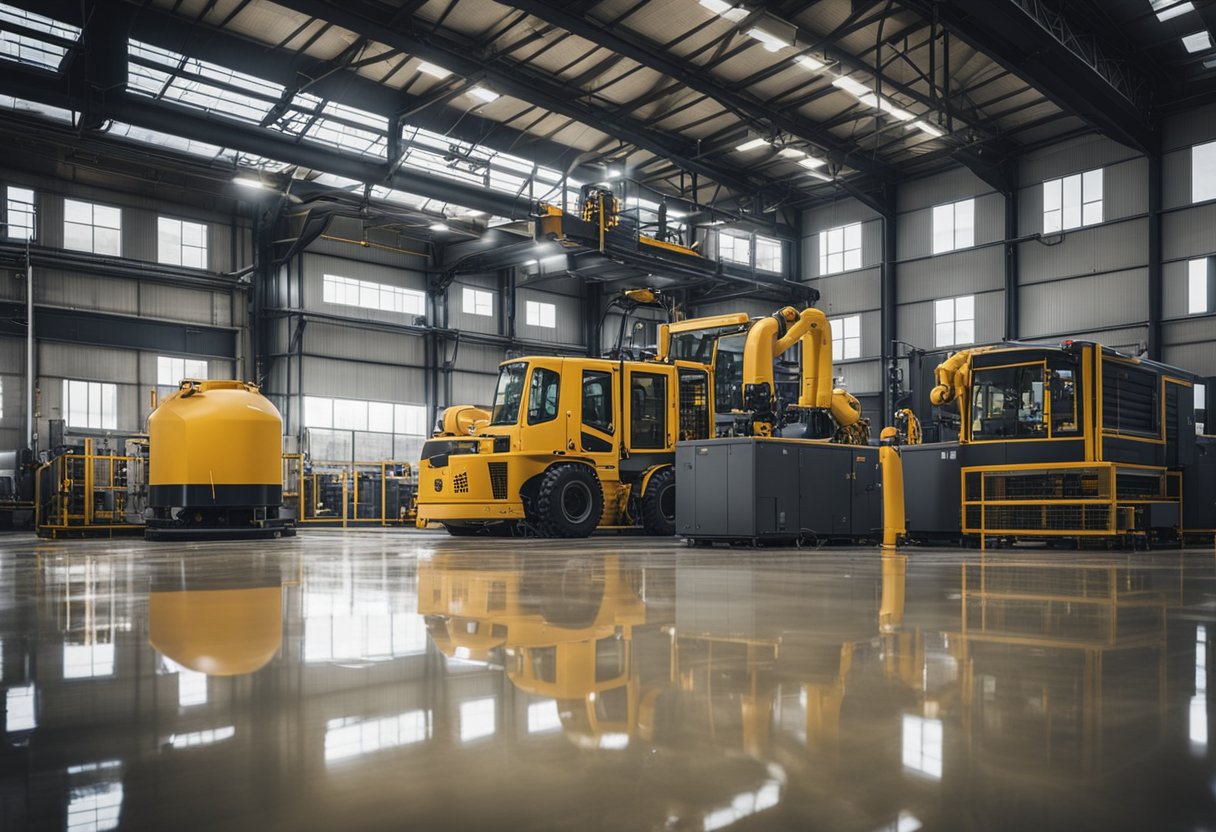
The performance of epoxy flooring is significantly impacted by environmental conditions and the quality of materials used. Recognizing these factors is essential for optimal flooring durability and functionality.
Environmental Factors
Moisture and humidity can profoundly affect the curing process of epoxy flooring. Excessive moisture in the concrete substrate can lead to improper bonding of the epoxy, resulting in a compromised floor.
| Factor | Impact on Epoxy Flooring Performance |
|---|---|
| Heat | Speeds up the curing process |
| High Humidity | Can cause blushing or poor adhesion |
| Sunlight | May lead to discoloration and UV damage |
Routine exposure to chemical spills must be considered, as certain chemicals can degrade the epoxy resin, leading to performance issues over time.
Quality and Type of Materials
Materials play a pivotal role in the success of an epoxy flooring system. Using low-cost options can sometimes mean lower quality, which can jeopardize the floor’s integrity.
- Resin quality: Affects durability and appearance.
- Hardener: Determines the cure time and overall strength of the floor.
It is crucial to match the type of epoxy system to the specific operational conditions it will face, such as heat or chemical exposure, for optimal performance.
Design Trends and Aesthetic Considerations
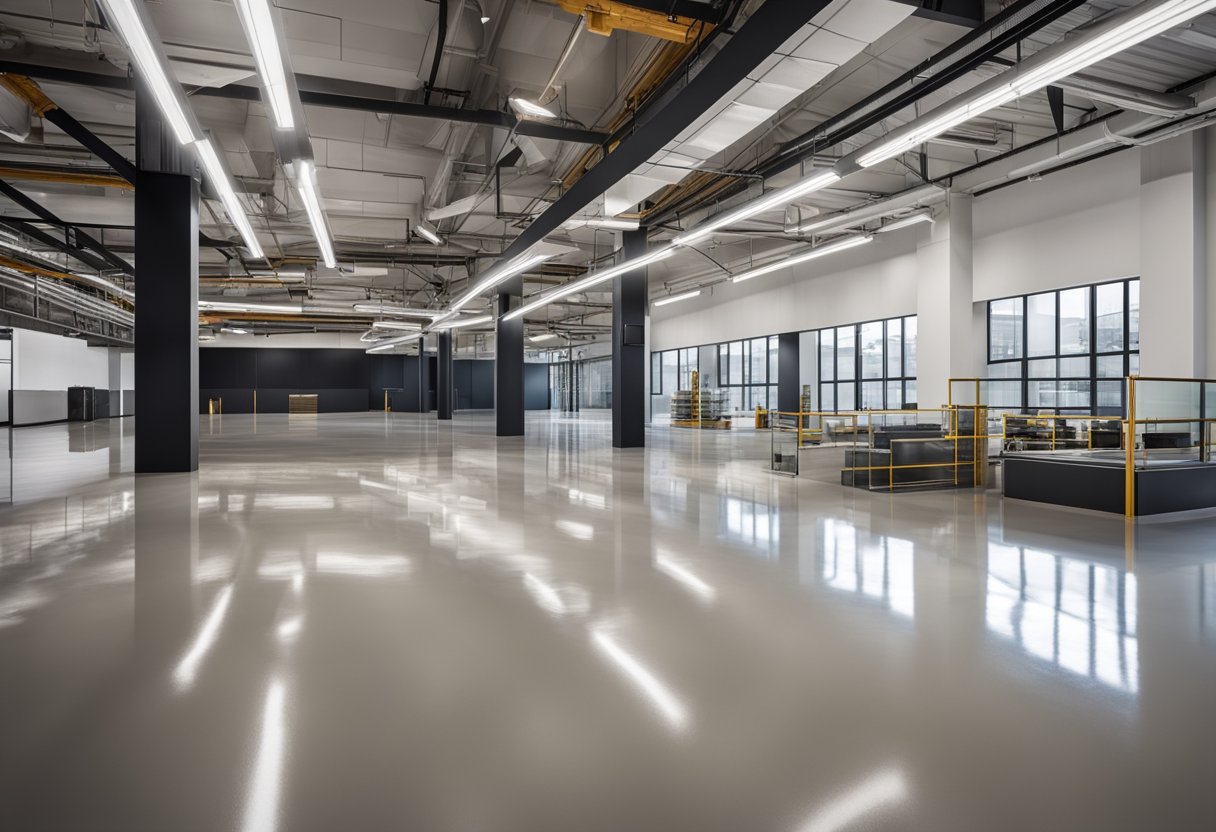
North Side Epoxy Flooring offers cutting-edge solutions that embrace contemporary design trends while providing options that cater to diverse aesthetic preferences.
Modern Epoxy Applications
Recent advancements in epoxy technology have enabled a wide array of applications far beyond traditional uses. Specifically within Brisbane’s flourishing market, designers and homeowners alike are selecting epoxy for high-traffic areas due to its durability and seamless finish. Metallic epoxy floors are especially popular for their ability to mimic natural phenomena such as a lake bottom glistening under sunlight or the rich hues of a cliff edge at dusk. The shimmering quality of metallic additives provides a depth and sophistication to flooring, establishing a modern ambiance.
Color and Pattern Choices
Choosing the right color and pattern for epoxy flooring is pivotal in achieving the desired atmosphere in any space. North Side Epoxy Flooring offers a palette that includes tones from understated grays, reflecting the stoic beauty of stone, to vibrant colors that make a bold statement. Here’s a breakdown of options:
- Neutral Tones: Ideal for minimalist or industrial aesthetics.
- Bold Hues: Suitable for spaces needing a splash of energy and vibrancy.
- Patterns: Ranging from geometric designs to organic shapes that mimic natural textures.
Clients have the flexibility to customize their floors by mixing different colors and chips to create a unique look tailored to their space. This customization can be crucial for businesses aiming to reinforce their brand colors or for residential spaces seeking a personalized touch.
Frequently Asked Questions
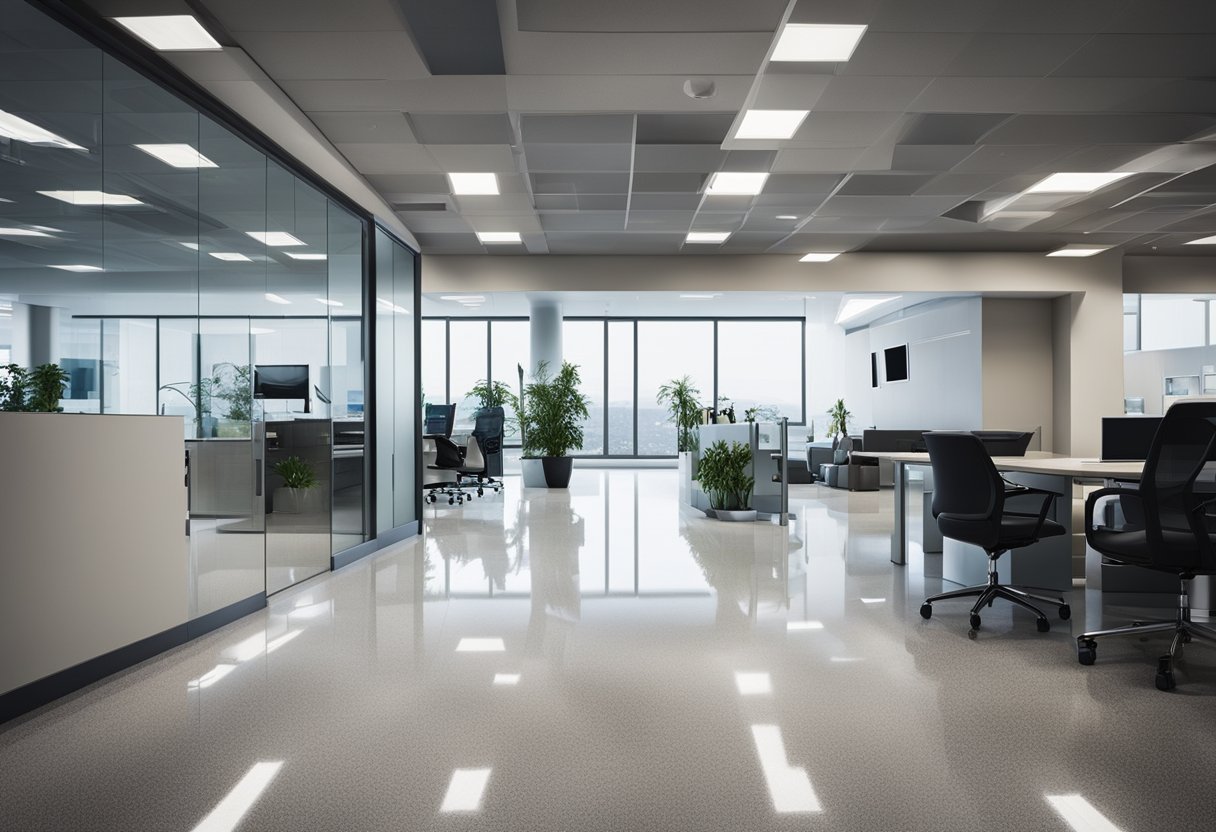
This section presents some common inquiries regarding North Side Epoxy Flooring to assist in understanding its cost-effectiveness, durability, benefits, user reviews, comparison to other flooring options, and property value implications.
How cost-effective is epoxy flooring compared to concrete?
Epoxy flooring can be more cost-effective over time compared to traditional concrete due to its low maintenance and longer lifespan. Initial costs may be higher, but savings are realized in reduced upkeep.
What factors influence the durability of epoxy flooring?
The durability of epoxy flooring is influenced by the quality of materials used, the precision of application, and the level of ongoing maintenance. Heavy-duty epoxy can withstand harsh conditions and heavy traffic for years.
What are the long-term benefits of installing epoxy floors?
Long-term benefits of installing epoxy floors include resistance to stains, ease of cleaning, and prevention of concrete wear and tear. They also offer an aesthetic appeal with a variety of finishes and colors.
How do user reviews rate the performance of epoxy flooring installations?
User reviews generally rate epoxy flooring installations favorably for their durability and aesthetic variety. Professionals skilled in application techniques tend to receive higher satisfaction ratings.
Which flooring options are considered superior to epoxy in terms of quality and why?
Some flooring options viewed as superior to epoxy in quality might include polished stone or hardwood due to their natural materials and timeless appeal; however, in industrial environments, epoxy often reigns due to its superior resistance and safety features.
Can epoxy flooring add value to a property and under what circumstances?
Epoxy flooring can add value to a property, particularly in garages, commercial spaces, and basements where a durable, attractive, and low maintenance surface is advantageous. Enhanced aesthetic appeal and functionality can attract potential buyers.
